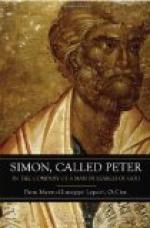“Then they’re stodgy pegs, without anything in them. If I was a square peg I’d never go into a round hole.”
“Suppose there was no other hole to go into,” demanded Peter.
“Then I’d fall out, or I wouldn’t go into any hole at all. I’d sooner be anything in the world than stodgy, Peter. I’d sooner be like that woman over there who is staring at me so!”
Peter glanced to one side, and then back at Julie. He was rather grave. “Would you really?” he questioned.
The waiter brought the Chianti and poured out glasses. Julie waited till he had gone, and then lifted hers and looked at Peter across it. “I would,” she said. “I couldn’t live without wine and excitement and song. I’m made that way. Cheerio, Solomon!”
They drank to each other. Then: “And love?” queried Peter softly.
Julie did not reply for a minute. She set her wine-glass down and toyed with the stem. Then she looked up at him under her eyelashes with that old daring look of hers, and repeated: “And love, Peter. But real love, not stodgy humdrum liking, Peter. I want the love that’s like the hot sun, and the wide, tossing blue sea east of Suez, and the nights under the moon where the real world wakes up and doesn’t go to sleep, like it does in the country in the cold, hard North. Do you know,” she went on, “though I love the cities, and bands, and restaurants, and theatres, and taxis, and nice clothes, I love best of all the places where one has none of these things. I once went with a shooting-party to East Africa, Peter, and that’s what I love. I shall never forget the nights at Kilindini, with the fireflies dancing among the bushes, and the moon glistening on the palms as if they were wet, and the insects shrilling in the grass, and the hot, damp air. Or by day, up in the forest, camped under the great trees, with the strange few flowers and the silence, while the sun trickled through the leaves and made pools of light on the ground. Do you know, I saw the most beautiful thing I’ve ever seen or, I think, shall see in that forest.”
“What was that?” asked Peter, under her spell, for she was speaking like a woman in a dream.
“It was one day when we were marching. We came on a glade among the trees, and at the end of it, a little depression of damp green grass, only the grass was quite hidden beneath a sheet of blue—such blue, I can’t describe it—that quivered and moved in the sun. We stood quite still, and then a boy threw a little stone. And the blue all rose in the air, silently, like magic. It was a swarm of hundreds and hundreds of blue butterflies, Peter. Do you know what I did? I cried—I couldn’t help it. It was too beautiful to see, Peter.”
A little silence fell between them. She broke it in another tone.
“And the natives—I love the natives. I just love the all but naked girls carrying the water up to the village in the evening, tall and straight, like Greek statues; and the men, in a string of beads and a spear. I wanted to go naked myself there—at least, I did till one day I tried it, and the sun skinned me in no time. But at least one needn’t wear much—cool loose things, and it doesn’t matter what one does or says.”




